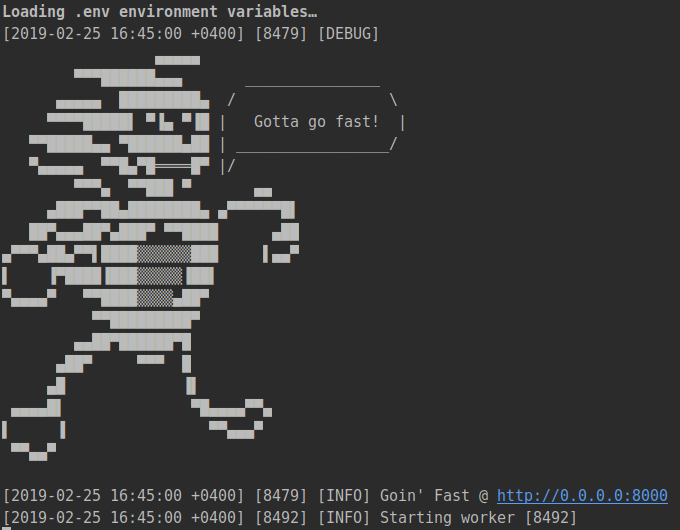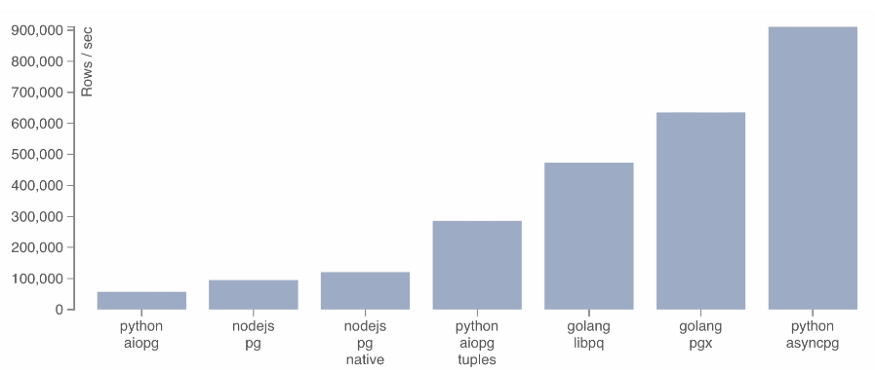In anticipation of the start of the " Python Developer. Professional " course, we have prepared a traditional translation of a useful article.
Hello everyone, in this article I will talk about creating simple asynchronous projects on the Sanic framework.
Introduction
Sanic – Flask - - Python 10 , . async/await, Python 3.5, .
– HTTP-, , .
, , , .
: github. .
Python3.6+
pipenv ( )
PostgreSQL ( , MySQL SQLite)
secure – , cookie - Python.
sanic-envconfig – , Sanic.
databases – Python, SQLAlchemy Core PostgreSQL, MySQL SQLite.
Pipfile.
pipenv -- python python3.6 , pipenv.
pipenv install sanic secure environs sanic-envconfig:
pipenv install databases[postgresql]postgresql, mysql, sqlite.
, .
├── .env
├── Pipfile
├── Pipfile.lock
├── setup.py
└── project
├── __init__.py
├── __main__.py
├── main.py
├── middlewares.py
├── routes.py
├── settings.py
└── tables.py setup.py, project .
from setuptools import setup
setup(
name='project',
)…
pipenv install -e . .env , .
_main_.py , project .
pipenv run python -m project main.py
from project.main import init
init() . init main.py.
from sanic import Sanic
app = Sanic(__name__)
def init():
app.run(host='0.0.0.0', port=8000, debug=True) app Sanic, , , debug.
…
pipenv run python -m project
Sanic . http://0.0.0.0:8000, :
Error: Requested URL / not found
, . .
. .env, Sanic.
.env
DEBUG=True
HOST=0.0.0.0
POST=8000…
from sanic import Sanic
from environs import Env
from project.settings import Settings
app = Sanic(__name__)
def init():
env = Env()
env.read_env()
app.config.from_object(Settings)
app.run(
host=app.config.HOST,
port=app.config.PORT,
debug=app.config.DEBUG,
auto_reload=app.config.DEBUG,
)settings.py
from sanic_envconfig import EnvConfig
class Settings(EnvConfig):
DEBUG: bool = True
HOST: str = '0.0.0.0'
PORT: int = 8000 , auto_reload, .
.
, .
databases asyncpg, PostgreSQL. . .

afterserverstart
afterserverstop
main.py
from sanic import Sanic
from databases import Database
from environs import Env
from project.settings import Settings
app = Sanic(__name__)
def setup_database():
app.db = Database(app.config.DB_URL)
@app.listener('after_server_start')
async def connect_to_db(*args, **kwargs):
await app.db.connect()
@app.listener('after_server_stop')
async def disconnect_from_db(*args, **kwargs):
await app.db.disconnect()
def init():
env = Env()
env.read_env()
app.config.from_object(Settings)
setup_database()
app.run(
host=app.config.HOST,
port=app.config.PORT,
debug=app.config.DEBUG,
auto_reload=app.config.DEBUG,
)-. DB_URL .
.env
DEBUG=True
HOST=0.0.0.0
POST=8000
DB_URL=postgresql://postgres:postgres@localhost/postgressettings.py:
from sanic_envconfig import EnvConfig
class Settings(EnvConfig):
DEBUG: bool = True
HOST: str = '0.0.0.0'
PORT: int = 8000
DB_URL: str = '', DB_URL . app.db. .
, SQL-.
tables.py SQLAlchemy.
import sqlalchemy
metadata = sqlalchemy.MetaData()
books = sqlalchemy.Table(
'books',
metadata,
sqlalchemy.Column('id', sqlalchemy.Integer, primary_key=True),
sqlalchemy.Column('title', sqlalchemy.String(length=100)),
sqlalchemy.Column('author', sqlalchemy.String(length=60)),
), books . Alembic – , SQLAlchemy Python.
SQLAlchemy. .
# Executing many
query = books.insert()
values = [
{"title": "No Highway", "author": "Nevil Shute"},
{"title": "The Daffodil", "author": "SkyH. E. Bates"},
]
await app.db.execute_many(query, values)
# Fetching multiple rows
query = books.select()
rows = await app.db.fetch_all(query)
# Fetch single row
query = books.select()
row = await app.db.fetch_one(query). routes.py books.
from sanic.response import json
from project.tables import books
def setup_routes(app):
@app.route("/books")
async def book_list(request):
query = books.select()
rows = await request.app.db.fetch_all(query)
return json({
'books': [{row['title']: row['author']} for row in rows]
}) , , init setup_routes.
from project.routes import setup_routes
app = Sanic(__name__)
def init():
...
app.config.from_object(Settings)
setup_database()
setup_routes(app)
...…
$ curl localhost:8000/books
{"books":[{"No Highway":"Nevil Shute"},{"The Daffodil":"SkyH. E. Bates"}]}Middleware
, -?
$ curl -I localhost:8000
Connection: keep-alive
Keep-Alive: 5
Content-Length: 32
Content-Type: text/plain; charset=utf-8, . , X-XSS-Protection, Strict-Transport-Security .. secure.
middlewares.py
from secure import SecureHeaders
secure_headers = SecureHeaders()
def setup_middlewares(app):
@app.middleware('response')
async def set_secure_headers(request, response):
secure_headers.sanic(response)middleware main.py:
from project.middlewares import setup_middlewares
app = Sanic(__name__)
def init():
...
app.config.from_object(Settings)
setup_database()
setup_routes(app)
setup_middlewares(app)
...:
$ curl -I localhost:8000/books
Connection: keep-alive
Keep-Alive: 5
Strict-Transport-Security: max-age=63072000; includeSubdomains
X-Frame-Options: SAMEORIGIN
X-XSS-Protection: 1; mode=block
X-Content-Type-Options: nosniff
Referrer-Policy: no-referrer, strict-origin-when-cross-origin
Pragma: no-cache
Expires: 0
Cache-control: no-cache, no-store, must-revalidate, max-age=0
Content-Length: 32
Content-Type: text/plain; charset=utf-8. " Python C: Python " .